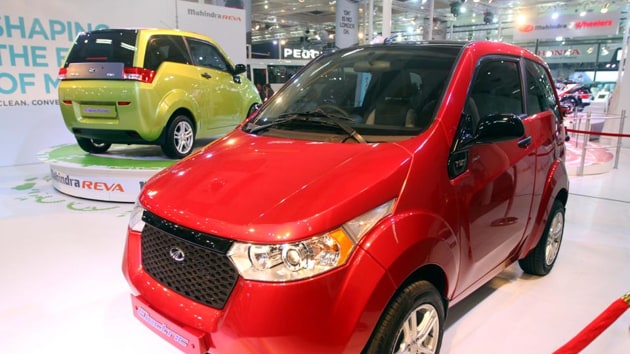India can emerge as a hub of electric vehicle production: Economic Survey
This comes in the backdrop of NITI Aayog’s proposal of making it mandatory for all commercial cars to be electric-powered from April 2026 amid criticism by the automobile lobby.
India is capable of emerging as a hub for the production of electric vehicles (EVs), in the process boosting employment generation, according to the Economic Survey tabled in Parliament on Thursday by finance minister Nirmala Sitharaman.

It may not be unrealistic to visualize one of India’s cities becoming the Detroit of the environmentally friendly vehicles in the future, said the Survey, adding: “Appropriate policy measures are needed to lower the overall lifetime ownership costs of EVs and make them an attractive alternative to conventional vehicles for all consumers”.
Budget 2019 Live Updates: Nirmala Sitharaman arrives in Parliament, will present budget shortly
This comes in the backdrop of government think tank NITI Aayog’s proposal of making it mandatory for all commercial cars to be electric-powered from April 2026 amid criticism by the automobile lobby, which claimed the government needed to follow a practical approach towards electric mobility without “needlessly” disrupting the automotive industry.
Reviewing the global scenario of EVs, the Survey noted that the market share of electric cars in India was a meager 0.06%, compared to about 2% in China and around 39% in Norway.
Also Read: Budget 2019: 10 things to look out for in Nirmala Sitharaman’s first budget
Citing NITI Aayog, the Survey noted that in India, two-wheelers have formed a lion’s share of EV sales. Electric two-wheeler sales reached 54,800 in 2018. The report added that the electrification of two-wheelers and buses had picked up pace in recent years.“NITI Aayog, in its meeting held on May 14, 2019 regarding National Mission for Transformative Mobility and Battery Storage has formulated an action plan to run electric twowheeler and three-wheeler vehicles and has proposed to ban all IC (internal combustion) engine powered two-wheelers and three-wheelers in India starting in 2025 for two-wheelers and in 2023 for three-wheelers,” minister for road transport and highways Nitin Gadkari told the Lok Sabha on Thursday.
The Economic Survey said access to battery charging facilities must be fostered to increase the market share of EVs.
“In India, the limited availability of charging infrastructure seems to be a major impediment to increased adoption of EVs,” it said.
The Survey also said the long time taken for completely charging EVs was another hindrance to popularising the vehicles.. “It is, therefore, an important policy issue to come up with universal charging standards for the country as a whole to enable increased investment in creation of such infrastructure.”
(For full budget coverage log on to livemint.com)
“It is equally important to provide information on public charger to the users of EVs through online maps and other means such as physical signage. This will encourage increased ease of adoption of EVs.”
Road transport accounts for around 90% of the total emissions in the transport sector, the second biggest contributor to carbon emissions in India. “Given the large import dependence of the country for petroleum products, it is imperative that there be a shift of focus to alternative fuels to support our mobility in a sustainable manner,” the Survey said.
Citing NITI Aayog, the Economic Survey estimated that if India reached an EV sales penetrations of 30% of private cars, 70% of commercial vehicles, 40% of buses and 80% of two- and three-wheelers by 2030, the country can save 846 million tonnes of net carbon dioxide emissions; it can also save 474 million tonnes of oil equivalent.
“In order to accelerate adoption of electric mobility as sustainable mobility solution in the country, significant investment is required in creating charging infrastructure. Another concern in this regard relates to the purchase price of electric vehicles, which needs tobe reduced through technology advancements. coupled with localisation and economies of scale in manufacturing of vehicle and battery,” said Pranavant, a partner at Deloitte India.
India is executing one of the world’s largest renewable energy expansion programmes with the share of renewable power in total electricity generation increasing from 6% in 2014-15 to 10% in 2018-19.
For enabling inclusive growth through affordable, reliable and sustainable energy, the report said India needs a 2.5-fold increase in per capita energy consumption to increase its real per capita gross domestic product (GDP) by $5,000 at 2010 prices, and enter the upper-middle income group.
India also needs a fourfold increase in per capita energy consumption to achieve a Human Development Index score of 0.8. India climbed one notch to 130 out of 189 countries, with a 2017 score of 0.640, in the latest human development rankings released in September by the United Nations Development Programme (UNDP). That put the country in the medium human development category.
Additional investments in renewable power plants up to 2022 would be about $80 billion and$250 billion for the period 2023-2030, the report said. The ministry of renewable energy has also planned to establish 500 GW of renewable energy capacity by 2030.






